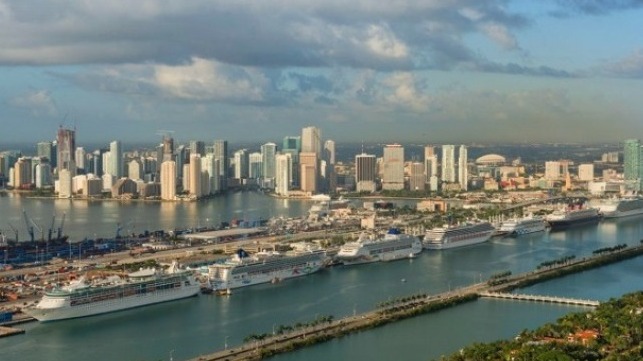Cruise Executives Optimistic as Occupancy and Satisfaction Rise

Speaking at the opening session of the Seatrade Cruise Global conference, cruise industry executives sounded optimistic about the progress being made on the restart of cruising, expressing satisfaction with the industry response to the COVID-19 crisis. They pointed to a quicker than anticipated recovery in industry segments and believe regulators have grown more comfortable managing the operations despite the pandemic, shifting traveler perceptions about acceptable risks.
"We know where we are headed," said Arnold Donald President and Chief Executive Officer of Carnival Corporation, discussing the outlook for both his brands and the cruise industry. He pointed to the company's progress bringing approximately 68 percent of its capacity back into operation. Donald stated that the company was experiencing 35 percent capacity in the U.S. but stronger occupancies in Europe, where the market resumed sooner.
"We are seeing more ships and more people, week by week," said Richard Fain, Chairman and CEO of the Royal Caribbean Group. He also said that as a company, they saw first-time cruisers among their passengers but admitted the industries need to attract more vacationers to the cruise market. Fain said they had anticipated that the strongest market, when they resumed sailing, would be the pent-up demand from repeaters and loyal cruise passengers, but they have also seen first-time cruisers coming to the ships.
Much of the industry's success at the restart they credit to the ability to control the ship's environment and the wide efforts to create and maintain the environment to manage against the coronavirus aboard the ships. A key part of the resumption, they believe, is getting the word out to travelers, ports and regulators about the industry's protocols and effort to control the environment aboard the cruise ships.
Pierfrancesco Vago, Executive Chairman of MSC Cruises, pointed out the efforts extended far beyond the national regulators. He said the cruise lines had to work across complex national regulations and consult with multiple authorities from the ports to the local health agencies.
"It was a trying but inspiring time," said Donald. He pointed to the collaboration and coordination of the industry, first as it moved to repatriate its crews and then worked with global regulators. He believes that travelers and the authorities have become more comfortable and understand the efforts, noting, "People have moved from the zero-risk mindset."
Travelers have been very excited to return to cruises, all the executives agreed, and the crew is excited to be back to work. "The crew's excitement is infectious," said Fain, saying that passenger satisfaction numbers are coming in very high since the ships resumed sailing. Through word of mouth, these passengers are helping the industry rebuild.
The executives also welcomed new entrants into the market, saying that it was healthy and drew attention to the overall industry. Like Disney before it, they expect that Virgin will leverage its strong brand to attract new people to cruising and help the overall industry's future development. They continue to view land-based vacations as the most significant competition to the cruise industry.
The executives believe the industry is building back strongly and will continue its recovery while responding to shifts in the virus and individual countries' efforts. They continue to highlight the variety of experiences offered on cruises as a key attraction. "The shipyards are building exciting pieces of hardware," said Vago, crediting new ships with helping to attract more people to cruising. Vago reported that MSC Cruises had been achieving 65 percent occupancy during the summer in Europe, but "it shot up to 85 percent capacity in the third quarter in Europe."
"We expect to be back to 2019 levels and 100 occupancy in our core markets by year's end," forecast Fain. He said the momentum was building to have everything in place by the "wave period" (the beginning of the year, which is traditionally the most considerable booking period for the industry).
"Cruising has resumed in more than 30 countries," said Kelly Craighead, President and CEO of the industry trade group Cruise Lines International Association. CLIA highlighted that the resumption has grown quickly with the reopening of the U.S. markets in the summer of 2021. Members went from 16 percent of their vessels operating in June to more than 50 percent currently, with a projection that 80 percent of the members' ships will be operating by the beginning of 2022. The industry is also well underway on recalling and rebuilding its global workforce of 1.2 million people.
